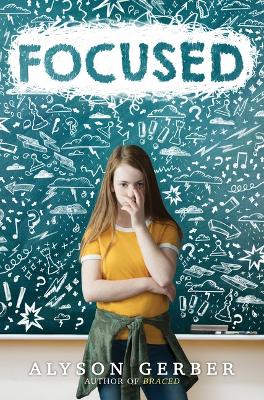Reviewed by Sam@WLABB on
Clea felt like she was failing at EVERYTHING! She was messing up her class assignments, hurting her friends and family - she just couldn't seem to do anything right. After a string of poor grades, her parents had Clea tested and discovered that she has ADHD. Now that she had an explanation for why these things were happening, would Clea be able to repair all the damage she had done?
Maybe it's because Gerber is writing from experience. Maybe it's just because she's a great writer. Whichever the case, I must say, that Gerber is so good at writing this type of story.
I loved Clea so much, and my heart went out to her as she was trying to adjust to her new normal. Gerber did an incredible job capturing her emotional ups and downs. First, as Clea was trying to deal with her lack of focus and impulse control, and later as she was coming to terms with her diagnosis and trying to learn to navigate her needs and advocate for herself. I really thought this part was handled wonderfully, and I thought it was important that we saw Clea's successes and setbacks.
I also liked that we saw how Clea's ADHD affected those around her. Clea generally was a wonderful friend and sister, but there were times, when her lack of impulse control got her into trouble. There was one friendship rift, that broke my heart. I liked that Clea never tried to use her ADHD to excuse her behaviors, but rather, as she learned more about her disability, she became more cognizant of her behaviors, and utilized the techniques the doctor equipped her with to curb the interrupting and blurting out, which was causing the friction between herself and her loved ones.
Another thing I thought was great, was how Gerber took us through the whole process - identification, testing, diagnosis, and treatment. There was quite a bit of good information relayed in the book, and it was worked into the story in a very organic way too.
She also showed, that being neurodivergent didn't mean you were broken. It meant that your brain just worked differently. I was really proud of Clea, when she figured out what she needed to succeed. Not only did she figure out what she needed, but she was very mature and asked for these accommodations when necessary. It's so important that people understand they should feel no shame asking for things that will help them succeed.
There were a ton of things I loved, and here's a short list of some of my favorites:
• Clea's friendship with Sanam was really special. They bonded over their love of chess, as well as over their mutual learning disabilities, and Sanam was such a positive force in Clea's life as well. Loved her!
• I never really played chess seriously, but I was so intrigued by all the chess stuff in this book. Gerber was able to transfer some of Clea's excitement to me, which I thought was great.
• There's a little touch of romance in the story, which was so, so sweet and cute and I loved it.
• Clea's little sister was a precious little star. The kid was able to bring happiness to every page she popped up on.
This book was heartwarming and informative. I think it would be a valuable read for a young person trying to come to terms with their own ADHD diagnosis, as well as for those, who love them.
*ARC provided in exchange for an honest review.
BLOG | INSTAGRAM |TWITTER | BLOGLOVIN | FRIEND ME ON GOODREADS
Reading updates
- Started reading
- 20 March, 2019: Finished reading
- 20 March, 2019: Reviewed
